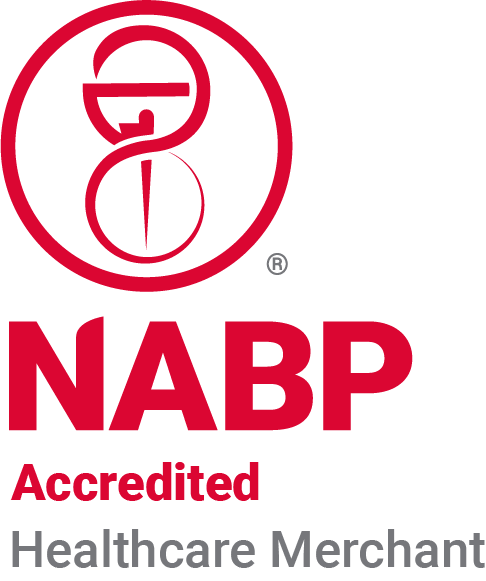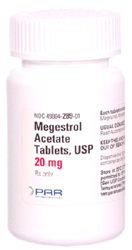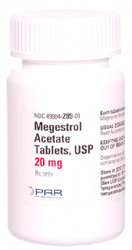Providing Quality & Trust || Clinic Website
Megestrol Ace Tablet
No Info
Starting at $0.46
$0.46 Each
Detailed Description
Megestrol Acetate
(me-jess-trole ass-uh-tate)
- Description: Progestin Hormone
- Other Names for this Medication: Ovaban®, Megace®
- Common Dosage Forms: Veterinary: 20 mg oral tablets.
Progestin (progesterone) used for hormonal treatment of a variety of conditions in dogs and cats. May be given with food or on an empty stomach, but giving with food may help prevent vomiting.
Megestrol can have many side effects, some of them serious. In particular, watch for changes in mammary glands (breasts)/nipples or any vaginal discharge.
How is this medication useful?
Megestrol is a progestin (progesterone) hormone used in female dogs for delay of estrus (heat) and to reduce the signs (eg, mammary enlargement and discharge) of false pregnancy. In male dogs, this medicine has been used to treat benign prostatic hypertrophy (BPH; prostatic enlargement). In cats, it may be used for a variety of skin and behavior-related conditions. Because megestrol can have serious side effects, it must be used with caution. The FDA (U.S. Food & Drug Administration) has approved this drug for use in dogs for the postponement of estrus and the alleviation of false pregnancy. The FDA allows veterinarians to prescribe and use products containing this drug in different species or for other conditions in certain situations. You and your veterinarian can discuss why this drug is the most appropriate choice.
- Synthetic progestin used in Dogs (female): for postponement of estrus & the alleviation of false pregnancy; Dogs (male): benign prostatic hypertrophy. Cats: Many dermatologic & behavior-related conditions.
- Contraindications: Pregnant animals or with uterine disease, diabetes mellitus, or mammary neoplasias; should not be used to treat bitches with pseudopregnancy; females should not be treated during diestrus, or with uterine hemorrhage.
- Caution: Thrombophlebitis.
- Adverse Effects: Cats: Profound adrenocortical suppression, adrenal atrophy, transient diabetes mellitus, polydipsia/polyuria, personality changes, increased weight, endometritis, cystic endometrial hyperplasia, mammary hypertrophy, neoplasias, & hepatotoxicity possible. Dogs: Increased appetite & weight gain, lethargy, change in behavior or hair color, mucometra, endometritis, cystic endometrial hyperplasia, mammary enlargement & neoplasia, acromegaly, adrenocortical suppression, or lactation (rare).
Uses/Indications:
Megestrol acetate (MA; Ovaban®) is FDA-approved for use in dogs only for the postponement of estrus and the alleviation of false pregnancy. In male dogs, it has been used for benign prostatic hypertrophy. MA has been used clinically for many dermatologic and behavior-related conditions, primarily in cats. Low-dose MA may be an alternative to surgery for contraception in free roaming cats, but questions of safety, efficacy, regulatory pathways, and ethics remain to be answered.
MA is indicated in humans for the palliative treatment of advanced carcinoma of the breast or endometrium.
What are the side effects of this medication?
Side effects of megestrol can be serious; this drug should be used with caution.
Side effects that usually are not serious include:
- Dogs: Greater appetite and weight gain, tiredness/lack of energy, mild changes in behavior, and changes in hair color.
- Cats: Greater appetite and weight gain, tiredness/lack of energy, and mild changes in behavior.
You don’t have to be overly concerned if you see any of these signs unless they are severe, worsen, or continue to be a problem. Contact your veterinarian if this happens.
Side effects that may be serious orindicate a serious problem:
- Mammary gland (breast) enlargement or tumors; changes in the animal’s mammary gland or nipple size or the development of a discharge.
- Uterine (womb) or vaginal discharge. Diabetes mellitus (reversible). Watch for greater thirst and need to urinate.
- Cats: weakness; tiredness/lack of energy; shaking; collapse (passing out); loss of appetite; weightloss; vomiting; diarrhea; yellowing of eyes, skin, or gums (jaundice); painful abdomen/stomach; seizures (convulsions); behavior changes; or hair loss.
If you see any of these signs, contact your veterinarian immediately.
Contraindications/Precautions/Warnings:
MA is contraindicated in pregnant animals or in animals with uterine disease, diabetes mellitus, or mammary neoplasias. It has been recommended that MA not be used in dogs prior to their first estrous cycle or for anestrus therapy in dogs with abnormal cycles. The manufacturer (Schering) recommends that mating be prevented if estrus occurs within 30 days of cessation of MA therapy.
This agent should not be used during pregnancy or to treat bitches with pseudopregnancy. Females should not be treated during diestrus, or with uterine hemorrhage. Do not use in females with prolonged heat unless cystic ovarian disease is confirmed and surgery, GNRH, or hCG are not viable options. Animals with diabetes should not receive megestrol.
Because this drug can suppress adrenal function, exogenous steroids may need to be administered if the patient is stressed (eg, surgery, trauma).
For estrus control, the manufacturer recommends that drug must be given for the full treatment regimen to be effective. The package insert states that “Ovaban® should not be given for more than 2 consecutive treatments,” but the reasons for this are unclear; some theriogenologists question the need for this precaution.
When used for reproductive control, it has been recommended that patients undergo: 1) a thorough reproductive history to rule out occurrence of estrus within the last 1-2 months (female in diestrus); 2) a complete physical exam; 3) palpation of mammary glands to rule out mammary nodules; 4) a vaginal smear to rule out presence of estrus.
In humans, MA is to be used with caution in patients with thrombophlebitis and is contraindicated as a test for pregnancy.
Adverse Effects:
In dogs, increased appetite and weight gain, lethargy, change in behavior or hair color, mucometra, endometritis, pyometra, cystic endometrial hyperplasia, mammary enlargement and neoplasia, acromegaly, adrenocortical suppression or lactation (rare) may occur. One dog reportedly developed diabetes mellitus after use. The reported incidence is 0.8% for pyometra in dogs that are treated per the label of the veterinary-labeled product (Ovaban®).
In cats, MA can induce a profound adrenocortical suppression, adrenal atrophy, and an iatrogenic Addison’s syndrome can develop at standard dosages (2.5 – 5 mg every other day) within 1-2 weeks. Once the drug has been discontinued, serum cortisol levels (both resting and ACTH-stimulated) will return to normal levels within a few weeks. Clinical signs of adrenocortical insufficiency (eg, vomiting, lethargy) are uncommon, but exogenous steroid support should be considered if the animal is stressed (eg, surgery, trauma). Cats may develop a transient diabetes mellitus while receiving MA. Polydipsia/polyuria, personality changes, increased weight, endometritis, cystic endometrial hyperplasia, mammary hypertrophy and neoplasias may also occur. Increased appetite and weight gain are not consistently seen, but MA is occasionally used as an appetite stimulant. Rarely, MA can cause hepatotoxicity (increased alkaline phosphatase) in cats. Megestrol potentially can exacerbate latent viral infections (eg FHV-1).
Limited clinical studies have suggested that MA may cause less cystic endometrial hyperplasia than other progestational agents, but cautious use and vigilant monitoring are still warranted.
Drug Interactions:
- CORTICOSTEROIDS: Megestrol used with corticosteroids (long-term) may exacerbate adrenocortical suppression and diabetes mellitus.
- RIFAMPIN: May decrease progestin activity if administered concomitantly. This is presumably due to microsomal enzyme induction with resultant increase in progestin metabolism. The clinical significance of this potential interaction is unknown.
Storage/Stability:
Megestrol acetate tablets should be stored in well-closed containers at a temperature of less than 40°C. The tablets may be crushed and administered with food. The veterinary manufacturer recommends storing the tablets from 2°-30°C (36°-86°F).

Powered by nopCommerce
This site is running in live payment mode. Real payments will be processed.

